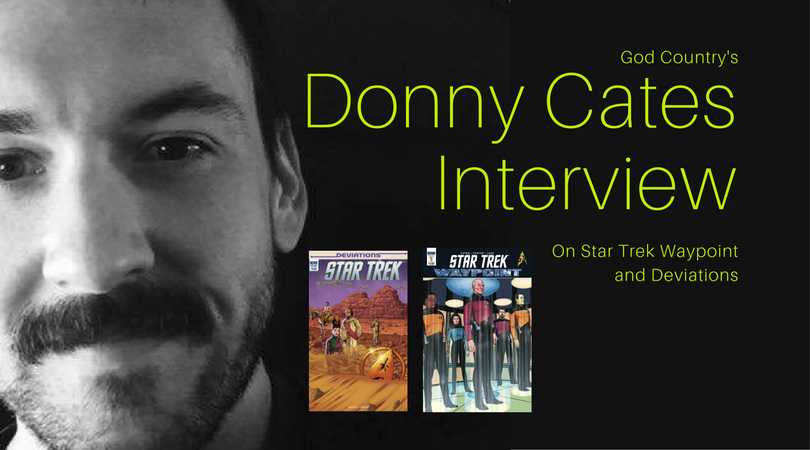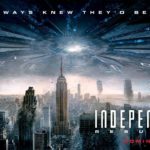
Origin stories inform readers of the journey characters take to their current and ever-changing status. Writer Donny Cates is not a character in a story, but an actual real person. His Star Trek origin story is just as important as any of the characters he pens. Little did he know that when his father first suggested he watched The Original Series, it would open up a brand new world to him, one that would eventually lead to his collaboration with IDW Comics and becoming a part of the Star Trek legacy itself.
Turns out when IDW’s Star Trek Editor Sarah Gaydos reached out to Cates and asked him to include a story for her Waypoint anthology, he resisted. Cates has always been a dedicated fan to his passions, including comic books, Buffy the Vampire Slayer, TOS and eventually The Next Generation, to which a former 24-hour sandwich shop co-worker introduced him. It was his passion and subsequent tweeting of TNG that lead to Gaydos finding him. Still, that passion did not equate into an interest to take a turn at the con of the Enterprise immediately.
“When Sarah reached out and asked me if I wanted to write a Star Trek story, I really hesitated,” Cates explained. “I take fandoms very seriously and always want to make sure I am honoring someone else’s fandom in a way I would want mine honored. Fans of shows, franchises and comics can tell when someone is just taking a gig for money, that they don’t have a real connection to these characters. I wanted to make sure I had the right story, not just take a gig to say I wrote Star Trek.”
When novelists Dayton Ward and Kevin Dilmore pitched their Waypoint story, which was included in issue #2, the duo had come up with more than a few ideas to present to Gaydos. Cates operates the other way, presenting the idea he loves the most first. It’s an interesting approach, as his passion obviously comes across in his pitch. That devotion to his idea saw his Waypoint story immediately accepted, while his Deviations story was also accepted with a bit of a tweak.
“Sarah hit me up after Waypoint and wanted me to do the Star Trek: Deviations issue,” Cates recalled. “She asked me to shoot her a few ideas. However, I only had one idea. I tend to pitch the one idea I love the most, not a thousand different ones. If it gets shut down, I’ll start talking about other ideas.
“The idea I had was not really usable in its first form. My deviation was what if the movie studios rebooted TNG instead of TOS – what it would be like if TNG was rebooted for a modern audience. It was one of those ideas that is always in my back pocket and I would talk about to creators at conventions.
“Because Sarah and I have such a good relationship, I prefaced the pitch telling her I know this is a story we can’t use in its current premise. The basic version of my TNG reboot is when we open, what if it’s not the starting point, but the Federation’s lowest point. Grounded in the years between TOS and TNG, everything has collapsed. Some kind of devastating event has clipped the wings and they are no longer in space. Now the fight is to get back into the stars, to really have the crew earn it. To spin on the title, they are in fact the next generation, but if they don’t succeed, they might be the final, which ups the stakes a lot. It’s the core of the idea Sarah and the other editors really liked. The what if solution lies into whatever that devastating event was; what if first contact was not with the Vulcans, but with the Romulans.”
Collaborating with IDW helped his story begin, but Cates imbued the tale with his own sensibilities. Weaned on both TOS and TNG, the author experienced the franchise’s glory days of storytelling. At its finest, Star Trek presents an allegory of the times in which it is written. With the current tumultuous state of affairs in the United States since the presidential election, Cates took to the pulpit so to speak.
Walking away from all those hours of Star Trek, the main theme for Cates is a hopeful version of the future, achievable and made possible by the collaboration of everyone. It’s this idea that sparked his goal for Deviations.
“I wrote an essay/epilogue in the back of Deviations, the title of it, ‘Why I chose this moment to deviate.’ My Deviations issue is bombastic, hardcore action. I’m the guy who always complained about reimagining Star Trek with fighting ways out of problems instead of thinking a way out of the problem.
“And then I started writing the script the day after the election, and it changed drastically. All of a sudden, sitting in front of me was a script about Earth as a prison planet for the Romulans. It’s about a group of oppressed and marginalized people that have been pushed down to the point of active rebellion. At this point, how do I not incorporate how I am feeling, the helplessness and powerlessness about how I am feeling?
“At the end of the day, that’s what Star Trek is about; it’s not a fantasy, it’s not science fiction. What it always meant (to me at least) is a promise – if we as species can get our act together, stop fighting, let intellectualism, science and compassion rule the day, Star Trek is the prize at the end of the day.”
Cates’ Waypoint story gesticulated in a different way than Deviations, as the author waited to accept Gaydos’ offer until he had the story he believed best honored Star Trek. After a conversation with his best friend, Seamus Martin, he confided that he might not be the guy for this job. Seamus saw it a different way, Cates was going to write a story. Kicking around ideas, Seamus presented Cates with a question – which characters is he most passionate about? The next two words immediately out of the writer’s mouth where LaForge and Data, and his Waypoint story went from impulse to warp.
“I thought it would be ideal to tell a story that was just Geordi and Data solving science problems. I very rarely as writer get to write characters that are way smarter than me. The idea was keeping them in space on the Enterprise. They are space science brothers. Geordi is captain – that is a no brainer. I always enjoyed visually in TNG episodes where he sat in the captain’s seat; I thought he cut a cool figure in that chair. It was a natural leap from there, Data’s brain is in the Enterprise and there are hundreds of Data’s. The rest of the story just fell into place.”
Reluctant at first to become a member of the Star Trek club, Cates still does not feel like his participation is real. The fact that he would not even consider being a part of Waypoint until he could honor the franchise is telling about the kind of person he is, one that would make an ideal Starfleet officer.
“I am somehow a part of this grand tapestry of the Final Frontier. I’m a very small part of it, but I’m aware I carry that banner. I’m adding a link in the chain. These characters do not belong to me, but to the fans, and I keep this in mind every time I am lucky enough to write Star Trek.”



